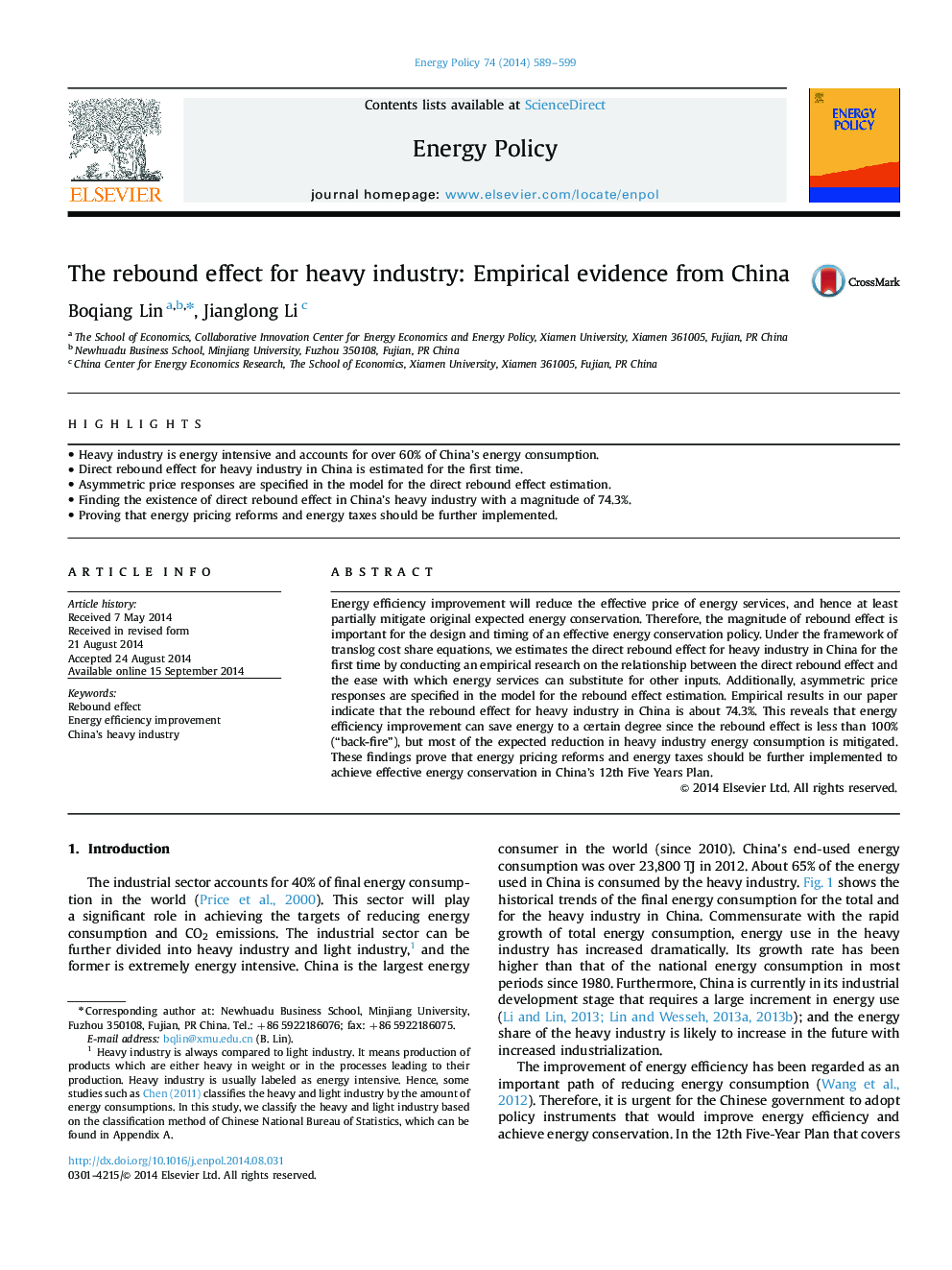| کد مقاله | کد نشریه | سال انتشار | مقاله انگلیسی | نسخه تمام متن |
|---|---|---|---|---|
| 7401653 | 1481284 | 2014 | 11 صفحه PDF | دانلود رایگان |
عنوان انگلیسی مقاله ISI
The rebound effect for heavy industry: Empirical evidence from China
ترجمه فارسی عنوان
تأثیر بازده برای صنایع سنگین: شواهد تجربی از چین
دانلود مقاله + سفارش ترجمه
دانلود مقاله ISI انگلیسی
رایگان برای ایرانیان
کلمات کلیدی
تأثیر بازتاب، بهبود بهره وری انرژی، چین صنعت صنایع سنگین است،
ترجمه چکیده
بهبود بهره وری انرژی، قیمت موثر خدمات انرژی را کاهش می دهد و از این رو حداقل به میزان تقریبا صرفه جویی در مصرف انرژی مورد انتظار را کاهش می دهد. بنابراین، اندازه گیری اثر باز شدن برای طراحی و زمان بندی یک سیاست حفاظت از انرژی موثر مهم است. در چارچوب معادلات به اشتراک گذاری هزینه انتقالگر، ما برای اولین بار اثرات مستقیم بازده برای صنایع سنگین در چین را با انجام یک تحقیق تجربی در مورد رابطه بین اثر مستقیم بازپرداخت و سهولت که خدمات انرژی می توانند جایگزین سایر منابع می شوند، تخمین بزنیم. علاوه بر این، پاسخ های قیمت نامتقارن در مدل برای تخمین اثر بازپرداخت مشخص شده است. نتایج تجربی در مقاله ما نشان می دهد که تأثیر بازده برای صنایع سنگین در چین حدود 74.3٪ است. این نشان می دهد که بهبود بهره وری انرژی می تواند به میزان خاصی از انرژی صرفه جویی کند، زیرا اثر بازده کمتر از 100 درصد است (اما به دلیل استفاده از انرژی خورشیدی)، اما بیشتر کاهش مصرف در صنایع سنگین کاهش می یابد. این یافته ها نشان می دهد که اصلاحات قیمت گذاری انرژی و مالیات های انرژی بیشتر باید برای دستیابی به صرفه جویی در انرژی مؤثر در برنامه پنج ساله چین طی شود.
موضوعات مرتبط
مهندسی و علوم پایه
مهندسی انرژی
مهندسی انرژی و فناوری های برق
چکیده انگلیسی
Energy efficiency improvement will reduce the effective price of energy services, and hence at least partially mitigate original expected energy conservation. Therefore, the magnitude of rebound effect is important for the design and timing of an effective energy conservation policy. Under the framework of translog cost share equations, we estimates the direct rebound effect for heavy industry in China for the first time by conducting an empirical research on the relationship between the direct rebound effect and the ease with which energy services can substitute for other inputs. Additionally, asymmetric price responses are specified in the model for the rebound effect estimation. Empirical results in our paper indicate that the rebound effect for heavy industry in China is about 74.3%. This reveals that energy efficiency improvement can save energy to a certain degree since the rebound effect is less than 100% (“back-fire”), but most of the expected reduction in heavy industry energy consumption is mitigated. These findings prove that energy pricing reforms and energy taxes should be further implemented to achieve effective energy conservation in China's 12th Five Years Plan.
ناشر
Database: Elsevier - ScienceDirect (ساینس دایرکت)
Journal: Energy Policy - Volume 74, November 2014, Pages 589-599
Journal: Energy Policy - Volume 74, November 2014, Pages 589-599
نویسندگان
Boqiang Lin, Jianglong Li,
